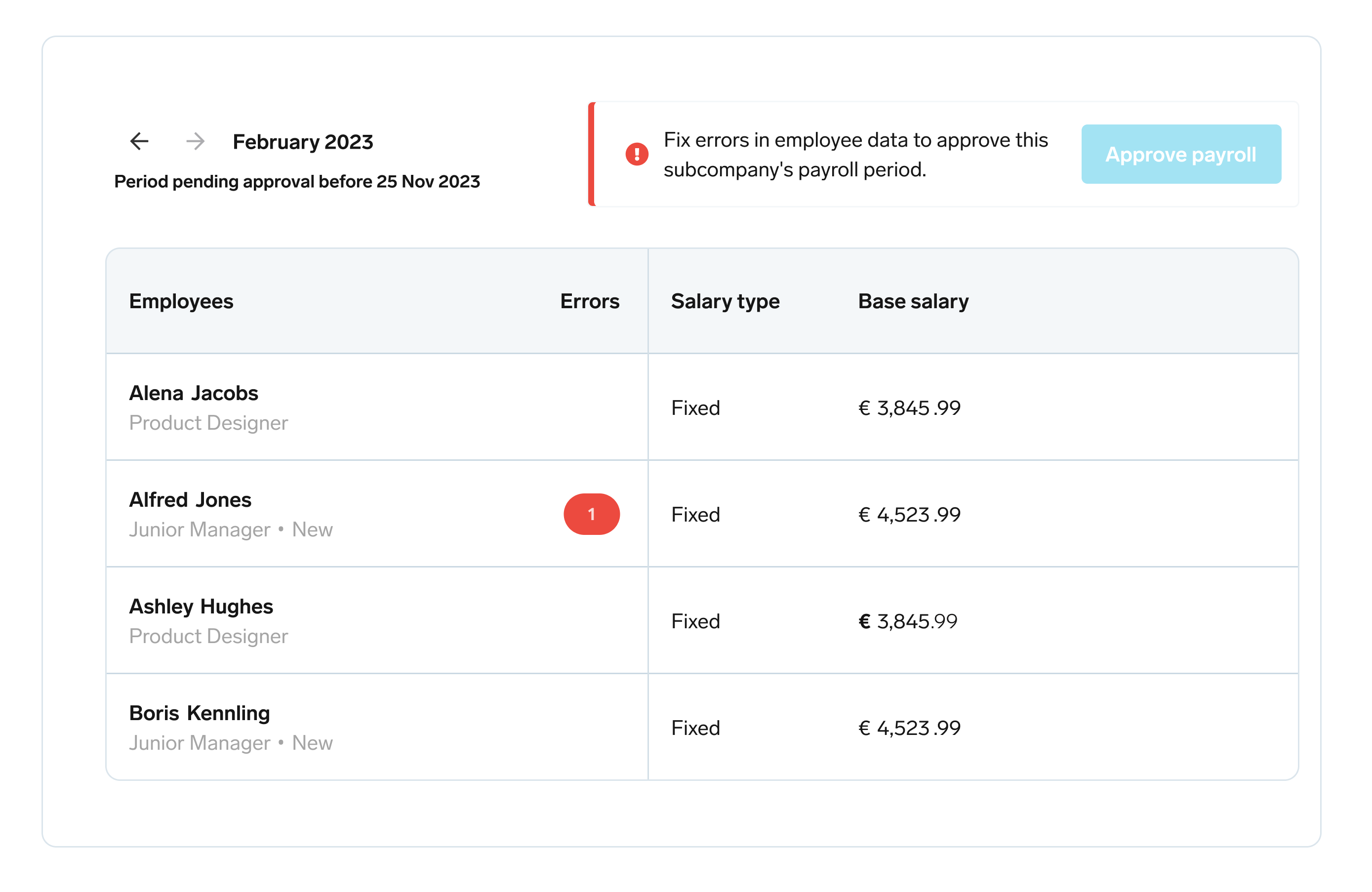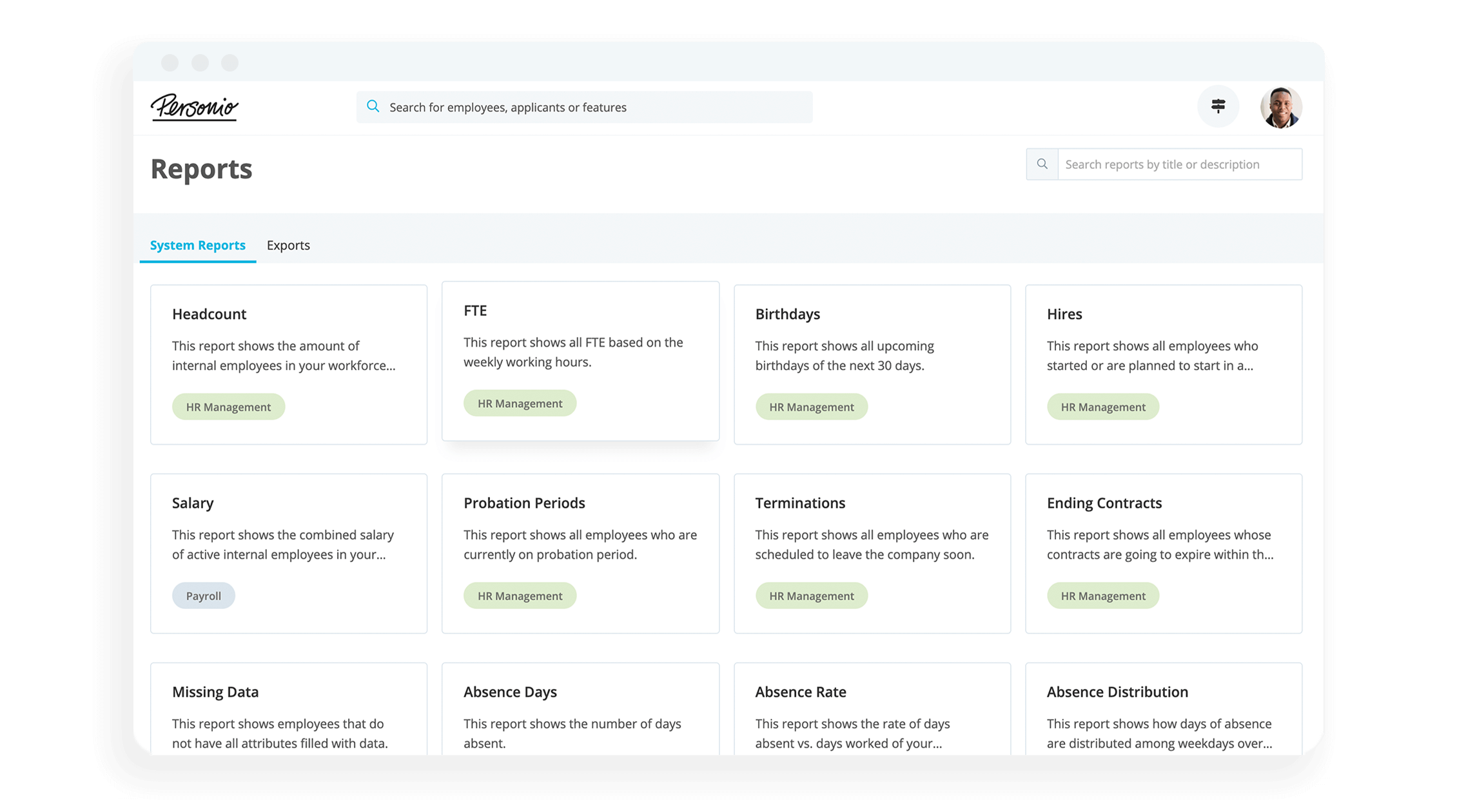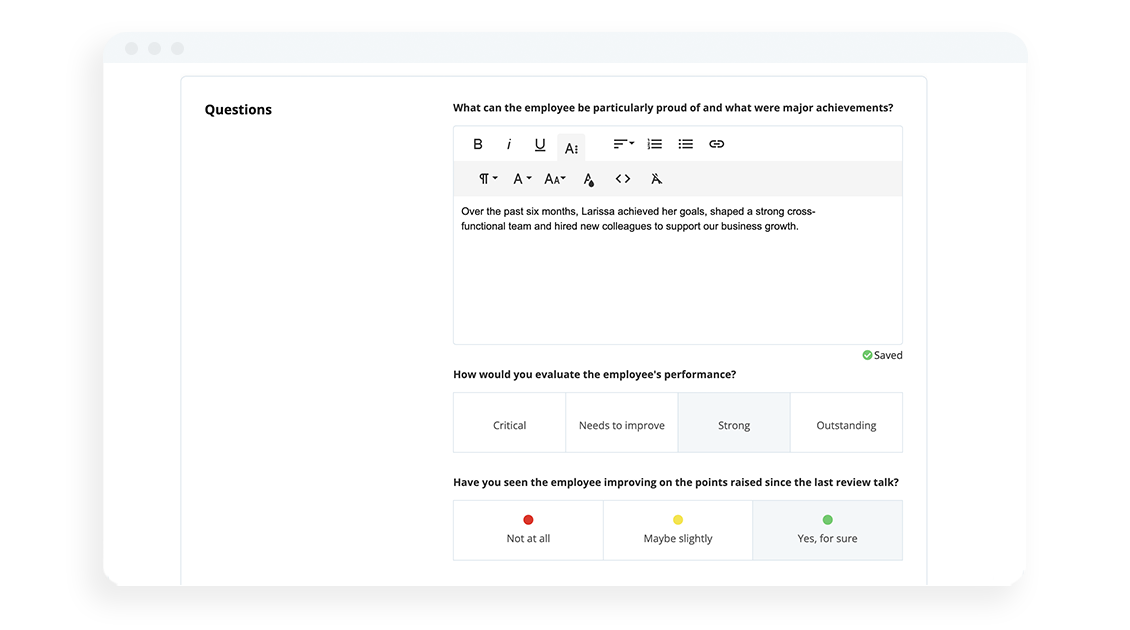
Start simplifying your payroll management
Learn how to streamline your payroll process to save time and ensure accuracy.
Read our guidePay Reviews: A Complete Guide for HR and Managers

This article aims to provide a comprehensive breakdown of pay reviews. You’ll learn what they are and how they’re performed so you’re prepared to conduct them within your own organisation.
Key Facts
Pay reviews help determine salary increases by measuring employee performance against job expectations.
The planning and performance review phases help ensure that the process goes as smoothly as possible while remaining objective.
Conducting a thorough pay review can also reveal unclear areas within your job descriptions that are lowering employee performance.
Contents
- 1What Is a Pay Review?
- 2Why Should You Conduct Pay Reviews?
- 3How Often Do Pay Reviews Happen?
- 4How To Conduct a Pay Review
- 5How To Prepare for the Process: The Planning Phase
- 6How To Evaluate a Candidate for Pay Review: Performance Review Phase
- 7How the Inform and Process Review Phase Is Conducted
- 8Frequently Asked Questions About Pay Reviews
- 9Conduct Your Next Pay Review With Personio
What Is a Pay Review?
A pay review is a formal assessment of an employee’s work performance used to determine whether they have merited a pay increase. Typically, a pay review may also factor in an employee’s tenure, changes in the market for talent or incoming budgetary concerns.
Why Should You Conduct Pay Reviews?
Conducting effective pay reviews is important for employees because:
It Motivates: Employees who know that a rise may be around the corner may invest more time and effort into their role.
It Helps Employees Reach Goals: Knowing there are benchmarks to hit – and hitting those benchmarks – can be quite fulfilling for employees.
It Improves Retention Rates: Employees that know they have room to grow, both in title and in salary, are more likely to stay with your organisation.
It Encourages Fairness: If all employees are eligible for a pay rise based on performance, this levels the playing field.
How Often Do Pay Reviews Happen?
Pay reviews are typically conducted annually, but some managers will perform one after the completion of a large project. They may also be performed if someone receives a promotion.
Several factors are considered during the review, including market data, available budget and personal and professional goals. There’s no legal obligation to hold a pay review, but many companies do so as an added perk of their reward programme.
How To Conduct a Pay Review
A salary or pay review is often conducted in three phases. These include:
The Planning Phase
The Review Phase
The Information Phase
Let’s take a deeper look at them to gain a better understanding of the pay review process…
Gain Access To HR Analytics That Power People Strategies

To inform and empower your people strategy, your HR team needs to have constant access to clean and custom analytics and reports. Learn about HR analytics and reporting with Personio today.
Drive Strategy Through Custom ReportsHow To Prepare for the Process: The Planning Phase
The starting point for a smooth pay review process is good preparation. These are the steps to follow:
1. Evaluate and Settle on the Pay Review Objectives
Figure out what the pay review is meant to accomplish. Share the objectives of the meeting with everyone involved in the process. This helps manage expectations while guiding employees and other stakeholders on how to prepare for an upcoming pay review.
2. Review the Employee’s Contract
Conduct an audit of employment contracts to determine if certain clauses could impact the process if ignored. For example, are they entitled to a certain pay rise per year? Is their pay frozen due to a probationary period? Confirming any restrictions or obligations before the pay review process helps avoid a breach of their agreement and serious legal penalties.
3. Reread and Analyse the Job Descriptions
Next, evaluate the job descriptions for each employee’s position and determine if they properly fulfill the expectations for that role. Each description should clearly represent the level of responsibility, the tasks they’ll perform and the anticipated level of job performance. This helps create a benchmark for your employee’s achievements.
4. Examine Market Pay Benchmarks
After examining a job description, go to an external job site and find if the employee’s current salary falls within industry standards. An internal audit of employees’ salaries can uncover serious wage discrepancies between people with similar roles, which the pay review can help correct.
5. Confirm Budgeting and Deadlines
Define the budget you’re working with during the salary review by measuring against your established goal for the meeting. Whether offering pay increases to keep up with inflation or to reward overachieving employees, knowing your budget and the schedule for appraisal helps ensure every salary is increased fairly.
6. Conduct the Performance Review
Once all your planning is finished, leadership within your organisation can begin to conduct performance reviews. During the process, they evaluate how well employee performance aligns with their expectations. This framework is then used to guide the pay reviews.
How To Evaluate a Candidate for Pay Review: Performance Review Phase
It’s important for your managers or HR representatives to accurately measure an employee’s performance to avoid unfairness or accusations of discrimination. Below is an overview of how to rate your worker’s accomplishments during the pay review process.
1. Transparency Is Key
Employees should be kept informed about what the pay review process will entail as the planning stage evolves. They should know exactly what to expect from the pay review process, including which aspects of their position will be reviewed. Springing a performance review on your staff makes it feel more like a penalty, especially if there are extenuating circumstances for a drop in performance.
2. Hand Out a Self-Evaluation Form
Issue survey and self-evaluation forms before the pay reviews take place to gain greater insight into your staff. How they view their responsibilities and performance can help you identify weaknesses in their job description and find solutions for them to increase productivity. Additionally, surveys can also work as an announcement that a review is underway and give employees time to raise concerns in advance.
3. Introduce an Employee Performance Rating Scale
An Employee Performance Rating Scale splits the responsibilities of a position into several categories you can use to rate employees in those areas. Establishing a standardised scoring system makes it easier to indicate when an employee’s performance falls above or below expectations in one or more areas.
How the Inform and Process Review Phase Is Conducted
The last step of the typical pay review process is to communicate results and feedback to your staff. Employers generally send out salary review letters containing the review’s outcome, any ensuing changes to the employee’s pay and the exact reason why their pay is being increased. This helps ensure that the process is seen as transparent, fair and objective.
Frequently Asked Questions About Pay Reviews
What Are Pay Reviews?
A pay review assesses an employee’s performance vs expectations to determine if their salary should increase.
How Long Does a Salary Review Take?
The length of a salary review can vary from employee to employee, depending on the complexity of the position and how well they’ve been performing.
How Often Are Pay Reviews Conducted?
Pay reviews are typically conducted annually. In some organisations, pay reviews may be conducted more frequently, timed to the completion of a big project. They may also be held upon a promotion or job title change.
Are You Obligated To Perform a Pay Review?
Organisations are not required to perform a pay review. However, many organisations do so because it’s a part of the company’s rewards programme. Even if it’s not required, it’s still important to review the employee contract to ensure all requirements in regard to salary are met.
What Factors Are Evaluated During the Pay Review Process?
The pay review process involves analysing several factors. A performance review is involved to ensure the employee met and exceeded expectations for the position. A market review is also conducted to ensure the employee’s salary is in line with what other companies offer. The organisation’s budget is also taken into consideration.
What Does the Planning Phase in a Pay Review Process Include?
The planning phase of the pay review process involves:
Determining Objectives. What are you hoping to get from the review? A fairer salary across your workforce? Increased productivity from clear job expectations?
Checking Contracts. Is there a clause in an employment contract that dictates how their pay should be handled?
Review Job Descriptions. Is the role’s description clear enough that employees understand what’s expected of them?
Researching Standard Market Pay. Are your employee’s salaries in line with similar positions in the job market?
Defining the Budget. Is your budget flexible enough to make the pay increases you promised to your employees?
What Does the Performance Review Phase Include?
The performance review phase of the salary review process involves:
The use of surveys, which determines your employees’ views of their job and find issues that negatively impact their productivity
A priority placed on transparency, so employees know what’s being reviewed
Sharing results with employees to keep the process objective and fair
Implementing a rating system that simplifies the analysis of an employee’s performance
Conduct Your Next Pay Review With Personio
The pay review process can be time-consuming given the amount of performance data you have to gather on your employees. Personio helps make this easier with its performance tool that easily tracks how your staff handles their tasks while providing holistic feedback on your schedule.
Schedule your free demo to learn more about how Personio can benefit your business.
Disclaimer
We would like to inform you that the contents of our website (including any legal contributions) are for non-binding informational purposes only and does not in any way constitute legal advice. The content of this information cannot and is not intended to replace individual and binding legal advice from e.g. a lawyer that addresses your specific situation. In this respect, all information provided is without guarantee of correctness, completeness and up-to-dateness.
